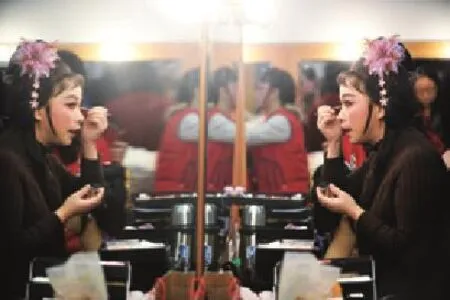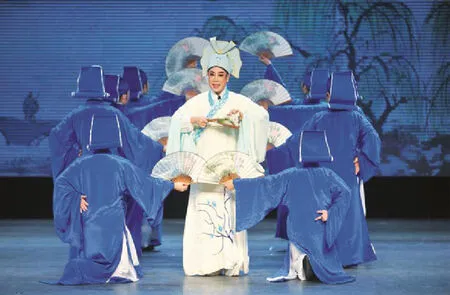Yueju Opera Love
2012-06-07LittleknowninthecapitaloneamateuroperatroupeismakingwavesByBaiShi
Little known in the capital, one amateur opera troupe is making waves By Bai Shi
Cheng Yuanna enters the dressing room at the Culture Center of Xicheng in Beijing one Sunday afternoon and immediately begins delegating tasks.
She instructs the volunteers on where to place the stage props and orders her performers to put on their makeup and costumes.
A bank worker during the week, Cheng passes her weekends as head of the Beijing Hundred Flowers Yueju Opera Troupe, an amateur performance group consisting largely of middle-aged women.
“Until the show is over, we shouldn’t eat anything from the late morning in order not to ruin our makeup,” says Cheng as she puts on her face. “We’re quite used to feeling hungry during rehearsals and performances.”
More than just a hobby
The troupe was founded in 1998 and is made up of amateurs with a passion forYuejuopera.
Yuejuopera is a traditional Chinese opera originating from east China’s Zhejiang Province. Cheng’s amateur troupe is largely unknown in Beijing, where the more established Peking opera prevails.
Cheng has been the troupe’s leader since 2010. “Two features make us unique,” Cheng said. “First, our members are women from all walks of life. Second, the average age is above 45.”
Cheng’s love forYuejuopera goes back 30 years. In 1982, Cheng saw theYuejuopera fi lmThe Dream of Red Mansions, an adaptation of a classic novel of the same name, and became fascinated.
“Although I was born in Beijing, I likeYuejuopera very much. It has a rich flavor of elegance and beauty that belongs to south China’s Yangtze River,” Cheng said. “Unlike Peking Opera,Yuejuopera is more suitable for females to perform and more attractive for a female audience because of its focus on love.”
“In my spare time, I taught myself how to sing some of the movie’s classic songs. But learning this way wasn’t feasible, so I attended aYuejuopera training program,” Cheng recalled.

IN THE MIRROR:A performerapplies makeup before a showin Beijing onNovember 4

THE STAGE: Cheng Yuanna performs a leading role in The Butter fl y Lovers,a classical Chinese love story, inBeijing on November 4
The training class ignited Cheng’s dream of performingYuejuopera on stage, although she harbored no ambitions of becoming a professional singer.
“SingingYuejuopera is my life but not my job. I want to enjoy it without the pressure.”
Running the troupe is no easy task,however. As a non-profit group, the Beijing Hundred Flowers Yueju Opera Troupe relies on outside funding. Cheng herself has donated tens of thousands of yuan to keep the group running.
Every show is a big event for the troupe and its supporters. The troupe’s friends and family contribute their part for each show,including guiding the audience to their seats,video-recording the performance and moving objects on and off the stage in between scenes.
“I greatly appreciate my troupe fellows and friends. Without their support and trust,the troupe would not be where it is today,”Cheng said.
Apart from being a hobby, the troupe is a source of spiritual comfort to some. Dai Lina,27, who works as a product manager for an international corporation in Beijing, is a new member of the troupe.
“I was born in a small town in Zhejiang Province. Though I listened toYuejuopera when I was young, I wasn’t interested in it until last year,” Dai said. “I was the only one in my family who wasn’t fond ofYuejuopera.”
Dai’s father passed away last spring. His last wish was that his daughter look after her grandparents. Whenever she found a few days to spare, Dai returned home for a visit but found that a massive generation gap limited interaction with her grandparents.
“They don’t know much about the modern urban lifestyle. We have few things in common. But I know they love theYuejuopera, so I want to learn it and perform for them,” Dai said.
Having discovered the troupe online, Dai joined in on the weekends to receive training by Cheng, eventually developing an appreciation for the art.
“Not long ago I performed some songs for my grandparents. They were very excited when they found out I would sing for them,”Dai said. “Yuejuopera is a spiritual remedy for both me and my grandparents.”
“Our troupe is always open to allYuejuopera lovers,” said Cheng. “For young people,we hope they can learn to enjoy this traditional stage art.”
A different story
Because the troupe has developed a reputation for putting on dazzling performances since its debut, one famousYuejuopera artist entrusted the troupe with a performance piece written exclusively for the group.
MostYuejuopera involves traditional love stories. Fed up with predictable female characters, Jin Yulin, aYuejumaster, was determined to do something different.
Huang Dao Po, written by Jin, was performed by the troupe in July in Beijing.
Speci fi cally, the story is about the life of Huang Dao Po (1245-1330), a widely known figure in Chinese history who improved textile technology and helped workers learn her advanced spinning skills. In the adaptation, Huang sacri fi ces love for the sake of her work.
YuejuOpera
Yuejuopera was originated from the traditional local opera of Shengzhou, a county of Shaoxing City in east China’s Zhejiang Province, in the mid-19th century.It was fi rst namedYuejuopera in Shanghai in 1925.
Yuejuopera differs from other traditional operas in that it consists largely of a female cast.
After a century and a half,Yuejuopera has become the second most popular form of local opera in China after Peking Opera.
In 2006,Yuejuopera was listed as China’s “intangible cultural heritage” by the State Council in China.
Zhao Danyu was cast as the lead. The 60-year-old was first trained inYuejuopera only four years ago and her initial instructor was Jin. Several years later when the two crossed path again, Jin was impressed with Zhao’s progress and wroteHuang Dao Pofor her and the troupe.
“The biggest challenge for Beijingers like me to learnYuejuopera is language,” said Wang Yan, another performer in the troupe.“The dialect inYuejuopera is from Zhejiang Province, very different from that we speak in Beijing.
“Therefore, I made an effort to learn the Zhejiang dialect. I joined a local troupe in Hangzhou as an apprentice. After several years with these Zhejiang colleagues, I was fi nally able to speak like a Zhejianger.”
Huang Dao Pohas so far been performed in Beijing and some other places since May,with more performances planned for the future. The opera was recognized by the Beijing Municipal Government for its part in enhancing the city’s culture.
“In spite of all our success, we will continue to learn and grow,” Cheng said. “Yuejuopera is a traditional cultural treasure. Every part of it, from voice to gesture, takes a long time to master.”
